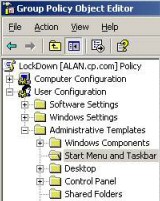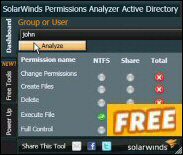Group Policy – Start Menu and Taskbar
Here is a classic selection of policies to shape the users experience of Windows XP or 2000 Professional. Combine the science of securing the desktop, with the joy of mastering Group Policy settings.
Group Policy Start Menu Topics
Administrative Templates
Windows Components
Start Menu and Taskbar (Note Taskbar not Task Manager)
* Guy’s Top Three Group Policies
- Remove the Run Command
- Add Logoff to the Start Menu
- Remove my Network Places
- Windows 7 Taskbar
- Summary of Group Policies for Start Menu
‡
Start Menu and Taskbar (Note Taskbar not Task Manager)
These Start Menu settings remind me of where policies started – with Poledit and NT 4.0. In this section, there are over twenty policies which just remove programs or folders from the Start Menu. Take as an example, * ‘Remove Run menu from Start Menu’. Ask yourself, ‘Do my users need this capability?’ If you answer in the negative, then they have no business purpose for the Run Box’. However if you remove this feature, then be sure to make all their programs available from the Start Menu.
Start Menu and Taskbar – Recommendations
Rather like putting blinkers on horses, restricting places such as: * My Network Places, My Music, Search and All Programs List, may make your users run faster! If you warm to this ‘Mr Nasty’ theme, then you could remove the clock and even hide the notification area.
In amongst all the restrictive settings is one positive item that I thoroughly recommend: * ‘Add Logoff to the start menu‘.
I have to say there are some ‘Luddite’ settings that I would not want on my network, like ‘Force classic Start Menu’, or ‘Prevent Grouping of Taskbar items’.
‘Remove Logoff from the Start Menu’, is an example of specialist Group Policy for particular circumstance. For example, you have a Kiosk or public area machine and you want only a special user to be logged on. (One who is heavily restricted!) See the run command in Windows 8
Guy Recommends: Permissions Analyzer – Free Active Directory Tool
I like thePermissions Monitor because it enables me to see quickly WHO has permissions to do WHAT. When you launch this tool it analyzes a users effective NTFS permissions for a specific file or folder, takes into account network share access, then displays the results in a nifty desktop dashboard!
Think of all the frustration that this free utility saves when you are troubleshooting authorization problems for users access to a resource. Give this permissions monitor a try – it’s free!
Download Permissions Analyser – Free Active Directory Tool
Start Menu Group Policy Tactics
When you employ Group Policies to lock down a Terminal Server session on a Microsoft Windows Server 2003-based I recommend that you create a new organizational unit and a test user to experiment with the settings.
Here are ideas to try:
Disable and remove links to Windows Update
Remove common program groups from Start Menu
Disable programs on Settings Menu
Remove Network & Dial-up Connections from Start Menu
Remove Run menu from Start Menu
Add Logoff to Start Menu
Disable changes to Taskbar and Start Menu Settings
Group Policy setting for Terminal Server
Disable and remove the Shut Down command or Remove and prevent access to the Shut Down command
Summary of Start Menu Group Policy
Here is a set of Group Policies to control the user’s Start Menu and Taskbar. For example, consider removing the run command. You can also be pro-active and add settings such as the Logoff button.
 Download my ‘Master Group Policies’ ebook only $6.25
Download my ‘Master Group Policies’ ebook only $6.25
The extra features you get in your eBook include: Spreadsheet with over 850 policies. Printer friendly version over Word A4 pages in Word.
See more user Group Policies for Windows
• GPO Tips •Troubleshooting Group Policies •Windows Components •GPMC
• Group Policies •Windows Settings •Logon Script Policies •IE Autocomplete
• Security Options • Group Policy Overview •GPO WMI Filter Examples
If you like this page then please share it with your friends

